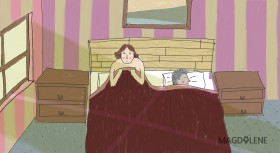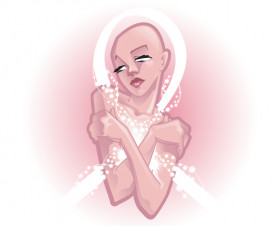I do not know what normal life feels like. Maybe “normal” was something I had at 15 years old, when I woke up feeling fit and well. Or maybe at 17, when I could study as long as I wanted at night without feeling wrecked in the morning. But as I grow older, I’ve realized that I should have been more grateful back then because I have not been feeling well since I was 22.
Maybe it started with life crises that hit me after I graduated in 2009. Coming back to Indonesia from years of living overseas and seeing how different life is in my own country shocked me. And not only did I find life very different in Jakarta, I was also struggling with family issues. My father had been cheating on my mother for years. On top of that, my first job was tough, requiring me to work long hours.
Overwhelmed, one night I could not stand it anymore and decided I would be better off dead. I went to the bathroom and picked up my pink eyebrow razor ready to slit my left wrist when I fell on the floor and cried endlessly. It was a terrible feeling that I could never forget.
The next morning, my healthy consciousness told me to consult a psychiatrist, I told her I felt like I was falling into a dark, bottomless abyss. Then, I cried again. I had never cried so much in my life before.
The Depression
The psychiatrist diagnosed me with major depression, which is a debilitating clinical illness that can disrupt someone from doing daily activities. It had interfered with my career, my relationship and overall physical vitality. According to my psychiatrist, traumatic life experiences, transition in life and hereditary cause were among some of the factors that triggered depression.
My road to recovery was not an easy route. The first two years were the most difficult from finding suitable medication that responded best to me, to adjusting to the new reality of having to juggle with depression and being a “normal” functioning human being according to society – meeting people, establishing relationships and earning a living.
As time passes, I eventually re-built my life piece by piece. I managed to secure a scholarship to the United Kingdom for post-graduate studies and graduated with outstanding results. I got a good paying job with work and life balance when I returned to Jakarta. Nevertheless, depression still visits me now and then. But I have more sunny days than cloudy days now. Overall, I have accepted my mental condition and I try my best to deal with it.
But, this new normal did not last long. Life never ceases to surprise me. Recently, I was diagnosed with a progressive illness called endometriosis. The doctors could not pinpoint exactly the cause of endometriosis, but it is associated with estrogen dominance in the body.
Endometriosis is a condition when all of your menstruation blood does not leave your reproductive organ. Instead, they pile up in, for instance, the ovary, fallopian tube or uterus, and leave scarred tissues that adhere to colon and rectum. Women suffering from endometriosis have to endure excruciating pain before and during menstruation, and have a higher chance of being infertile.
In my case, endometriosis has developed into endometrium (cyst caused by blood piled up in ovaries) and created tissue adhesion to my colon.
The Endometriosis
I came to know this new health condition when I consulted my psychiatrist for my depression after taking contraceptive pills to ease my menstrual pain. She suggested me that I consulted an obstetrician-gynecologist on other methods to ease cramping besides the contraceptive pill, because it caused hormonal changes that triggered depression.
I know contraceptive pills can potentially causes depression. But, I have to make a choice because my menstrual pain was too much to bear and it is unhealthy to take high doses of painkiller every month for three to four days (imagine if you have to take it for another 20 more years). I had had a painful period since high school, but all the ob-gyns I visited during my teen told me that these cramps were caused by stress or lack of exercise – despite my persistence that I was very active in sports – and they prescribed me painkillers. As I had been consuming painkillers over the years since high school, my body has developed resistance and now needs higher doses.
As suggested by my psychiatrist, I went to two ob-gyns to find out about other methods besides the contraceptive pills or painkillers. After uncomfortable pelvic exams (including MRI), both ob-gyns confirmed one single condition – endometriosis.
When I first digested that I have endometriosis and its potential to affect my reproductive health, I almost cried. How can such a serious illness only be diagnosed after more than 10 years? Is knowledge in the disease still very limited? Apparently so: many endometriosis patients only get the diagnosis after the disease has damaged the reproductive organs.
The doctor prescribed a progesterone-only hormone treatment to suppress estrogen hormone and to shed the endometrium. Many women undergoing this treatment experience menstruation for months. In addition, the pill also has undesirable side effects such as depression, fatigue, loss of libido, migraine, back pain and many others.
I have started the pill for three weeks now. In the first week I had throbbing headaches. It was so bad, I sometimes felt there was an earthquake. I also had hot flushes, back pain and fatigue. However, the effect started to subside in the third week. Although I still feel a mild headache and fatigue on a daily basis, I guess it could be worse; I just have to deal with it.
I am about to have another appointment with my ob-gyn to examine the development of my condition to decide on next treatment. I may get a new prescription due to my persisting headache and fatigue. This means another type of hormonal pills with its own set of side effects. I am anxious for sure. I only wish I could be better, if wishing to be fully healthy is overrated.
I guess the takeaway from my illnesses is I have never stopped learning myself through them. My illnesses have forced me to see life as it is with its ever-changing state that I cannot control. I have learned to live my life day-by-day to the fullest, whether at work or when I’m simply having lunch with my loved ones. This way, life feels like a fresh lemon juice after long workout session. This way, I can see that my illnesses have taught me to see the better side of having lemons in life.
Ambarella is a suicide survivor with endometriosis who loves writing in a crowded café every Saturday morning. She is renewable energy supporter. Ambarella loves her slightly overweight yellow Labrador.








Comments